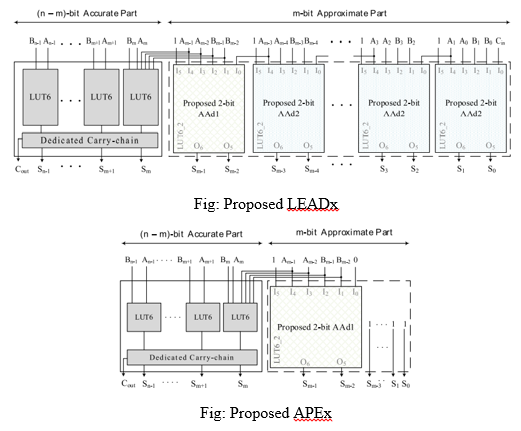Low Error Efficient Approximate Adders for FPGAs
Also Available Domains Arithmetic Core|Xilinx ISE
Project Code :TVPGTO620
Objective
The main aim of this paper is to design low error efficient approximate adders for FPGAs. We are implementing the approximate adders based on optimized LUT based designs at the LSP of the adder implementation.
Abstract
In this project, we are aimed to design an
approximate adder which is based on LUT structures. In general whatever the implemented
approximate or accurate adders are mostly implemented in ASIC implementations
and sometimes based on the application when these modules are incorporated in
FPGA based applications which implies tat that the reprogrammable or reusable
circuits involves such ASIC based modules, these FPGA applications are unable
to meet the real time parameters as per the specifications. So in order to
apply it in Re programmable or re-usable circuits, here we are first
introducing two different 2 bit adders which are implemented using LUT
structures. After that these are utilized to construct n bit adder which is
n-bit approximate adder. Based on the usage of the proposed two bit adders,
here we are suggesting two different n bit approximate adders. The two proposed
n bit approximate adders are LEADx (low error and area efficient approximate
adder) and APEx (area and power efficient approximate adder. Both approximate
adders are composed of an accurate and an approximate part. APEx has smaller
area and lower power consumption than the other approximate adders than the
existing adders. As a case study, the approximate adders are used in video
encoding application.
NOTE: Without the concern of our team, please don't submit to the college. This Abstract varies based on student requirements.
Block Diagram

Specifications
Software Requirements:
- Xilinx Vivado Tool
- HDL: Verilog
Hardware Requirements:
- Microsoft® Windows XP
- Intel® Pentium® 4 processor or Pentium 4 equivalent with SSE support
- 512 MB RAM
- 100 MB of available disk space
Learning Outcomes
- Basics of Digital Electronics
- VLSI design Flow
- Introduction to Verilog Coding
- Different modeling styles in Verilog
- Data Flow modeling
- Structural modeling
- Behavioral modeling
- Mixed level modeling
- Introduction to Arithmetic circuits
- Knowledge on types of approximate adder circuits
- Different approximation techniques
- Knowledge on approximate FA adder designs
- Applications in real time
- Xilinx Vivado for design and simulation
- Generation of Netlist
- Solution providing for real time problems
- Project Development Skills:
- Problem Analysis Skills
- Problem Solving Skills
- Logical Skills
- Designing Skills
- Testing Skills
- Debugging Skills
- Presentation Skills
- Thesis Writing Skills
Demo Video
Related Topics


 Paper Publishing
Paper Publishing
